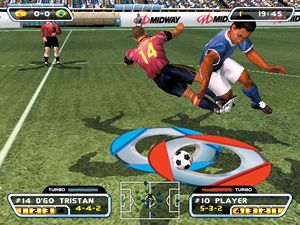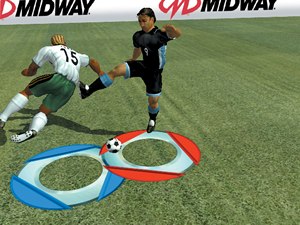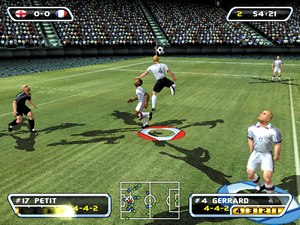Gee Jimmy, That Looked Like a Foul…
Warmongers aspiring to world domination should pay attention to Midway’s latest
hack-and-score sports title, RedCard Soccer 2003. While most would-be Napoleons
use guns, destructo rays and Mini-Me’s
in their conquests, RedCard 2003 proves that to bring the world under your
iron grip, you’ll need only one thing: soccer. And a sturdy thumb.
While
Midway is famous for cartoonish, over-the-top representations of sports, RedCard
sticks to realistic soccer tighter than Hitz
or Blitz sticks to real hockey or football.
The result is a game that plays a lot like EA’s FIFA series, but with
cooler defensive plays and lots and lots of violence.
Unfortunately, RedCard seriously lacks the depth of modes found in
the FIFA games. Your only options are ‘Friendly’ games (Exhibition),
World Conquest (where you try to become the Stalin of soccer), and a Tournament
mode where yourself and up to three other friends can compete in a custom tournament.
You can allegedly customize teams, but all this really involves is importing
a currently existing team and changing it’s attributes (aggressiveness, defense,
speed, etc.) When you use your new custom team, the announcers still refer to
them as the team you imported (for example, Denmark).
RedCard‘s World Conquest mode is where most of the action takes place.
You pick either a preexisting team or one of your ‘custom’ teams (like I said,
a preexisting team), and play through six continents. Each continent has a handful
of teams (except Europe, which has a ton), and the last team on each continent
is comprised of something silly like dolphins (Australia) or S.W.A.T. agents
(United States…how funny) or Apes (Africa…how tasteless). Upon beating each
continent, you unlock a couple new fields and the wacky final team.
If you conquer every continent, you get to enter the Finals Mode, in which
you play an entire season and try to win – what else – the World Finals. So
basically, you have to play a ton of exhibition games to even access the season.
The question is, will you want to play that much RedCard Soccer?
You actually might. In spite of the modal weaknesses, RedCard plays
really well. While some players might prefer a completely over-the-top, wacky
approach to sports, RedCard‘s firm foundation in real soccer via their
use of the FIFA model, plus over the top attacks and slow-mo super-strikes makes
this a uniquely playable game.
Fundamentally, RedCard is a tough soccer game. Scoring goals is still
somewhat difficult; you can’t just drive all the way up the field and score
with one player. You actually have to pass the ball. To help you in your international
trek are a boost meter ad a turbo meter. Turbo equates to sprint, while the
Boost button, when pressed in conjunction with a normal move like a slide tackle,
does a super-duper-so-hardcore-your-foot’s-on-fire slide tackle.
Your entire team draws from the same boost meter, so if one player uses all of it up, it will be gone for every other player on the team. As a result, deciding how to spend your boost adds a strategic element to the game.
One of the coolest looking uses of boost is in conjunction with a strike.
Get close enough to the goal, press boost and shoot at the same time, and watch
time slow down as your player executes a Matrix-style shot, with fire
and explosions and whizz-bang particle effects included.
 While
While
this attack looks cool, it doesn’t function like it should. RedCard is
supposed to have an aiming scheme, but it doesn’t. The ball goes all over the
place and the keeper usually catches it. Shots from outside the keeper’s box
score just as regularly as shots from five feet in front of the goal, which
is absurd. In fact, there’s a sweet spot in the game that’s good for a score
nearly every time, and it seems to be about six feet outside of the keeper’s
box.
This could be remedied if the slow-MO shots acted like Bullet-Time from Max
Payne and allowed you to precisely aim your shot. Maybe next time?
The graphics are relatively low-caliber. The stadiums look decent (especially
the underwater Australian stadium, wow!), but some are absurdly counterintuitive.
For example, the S.W.A.T. Team’s field and stadium are black, as is the S.W.A.T.
team itself, making their players impossible to see. The players look decent,
but not refined, and there aren’t any great lighting effects after goals like
in the FIFA games.
The animation is very good, though, complete with some of the best-looking slams ever included in a game. My personal favorite is the straight on head-butt, although the flaming flying kick is spectacular.
The game sounds fine, with good impact sounds adding to the collisions. Simon
Brotherton and Chris Kamara provide the play by play reasonably well. Plus,
you can hear the commentary in English, Spanish, French, German, Italian and
Japanese. Obiettivo!! Ziel!!! Goooooaaaaaal!!!!!
Finally, a word about the hits – they rock. There are three different hits, each with a Boost-enhanced version. Weak and strong attacks can be avoided by jukes, while the slide tackle can be avoided by hurdling. The ball changes feet very frequently, and if you want to stay in the game, you have to be very precise about your attacks and evasions.
While some fans may be disappointed by the fact that this game is grounded
in reality and not completely insane, those with a finer palette will enjoy
RedCard‘s uniquely violent and rewarding gameplay. If this game had more
options, modes, customization, and better licensing, it might be one of the
best soccer games on the market.

-
Keeps it real...
-
...real violent!
-
Commentary in Italian?!
-
Fun!
-
So-so graphics
-
Lame customization
-
Not enough modes / depth







